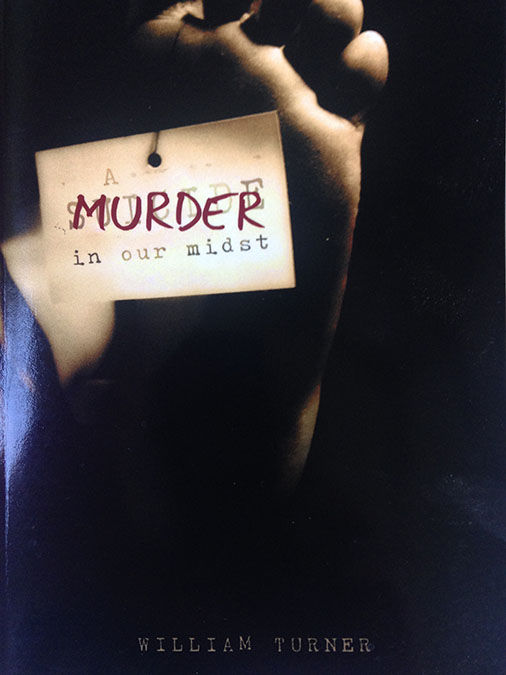Despite the fact that he was married, is a father, and had a long career as a supervisor working for the State of California, William Turner has always harbored regrets that he didn’t become a Catholic priest.
But now, at age 67, he has channeled that sense of sadness and misplaced ambition into the deep emotions found roiling beneath the surface of his debut novel, the mystery “Murder In Our Midst.”
The novel blends period flavor with the race-related themes of acclaimed author Walter Mosley and the classic twists and turns of an Agatha Christie novel.
The story follows a black Scotland Yard detective named Sir Robert Winchell, who receives a letter from his (white) best friend from childhood, Raymond Beevant, claiming that someone is trying to kill him.
When Beevant turns up dead, Winchell dives into an investigation that brings back both the memories and the realities of racial prejudice he faced as a young man. And according to Turner, that chance to explore the still-hot topic of race in the context of an escapist mystery novel was a large part of what drove his efforts on the book.
“My background in government and my experience as an African-American raised during the turbulent times of the 1960s gave me unique insight into this subject,” says Turner. “I’ve always had a passion for mysteries and now that I’ve retired from my position as a supervisor for the State of California, I’ve devoted myself to writing.”
Turner was born in Birmingham, Alabama, but was raised mostly in Boston. He was educated in Catholic schools and felt the calling to be a priest as early as 9-years-old, but was told by his closest priest advisor to attend high school and gain more life experience.
“I wanted to be a priest, but I questioned if I could walk into the monastery doors and not look back without regrets. When I was 16 or 17, the priest said make sure you try the world and know what you’re missing. My life went completely out of control,” Turner recalls.
“I fell into drinking, immorality, brushes with the law. It was like falling into a cesspool. Extricating myself, I was never able to get the stench of immorality off me and thought I would never be accepted as a priest. I got married but I still always had the feeling I should have been a priest.”
Instead of pursuing a priestly vocation, Turner got married and raised his son, Ontonio, and now is the proud grandfather of three.
“I really do appreciate that confession has forgiven me, but I make an analogy. You break the finest china, you apologize with tears in your eyes, they forgive you, but the plate has to be replaced. I felt I let almighty God down. I have a very accusing conscience. The errors in judgment in my opinion were deplorable,” explains Turner. “I had all the tools to resist and make informed decisions, but it was like I was guided in a different direction.”
He continues, “When you extricate yourself from this environment, you ask how you could let yourself fall? It is not that I am beating myself over the head for these errors in judgment, but it’s like asking almighty God, ‘I am sorry for these errors in judgment. I know you forgive me but I don’t forgive myself.’”
Thankfully, Turner’s new creative outlet as a mystery writer has helped. He chose mystery as his genre of choice due to his lifelong enjoyment of books by Agatha Christie and Sir Arthur Conan Doyle’s Sherlock Holmes novels.
Turner found further inspiration for his novel’s racial themes from his own time growing up in the divisive South before his family moved to Boston in his teen years. He had one great, lifelong white friend whose caring for him across color lines drove a lot of the deeper, more emotional moments in “Murder In Our Midst.”
“The book has two people of diverse backgrounds and social levels who come together as friends. Those who have read it said the relationship is quite enviable and serves to show there are friendships between the two races,” says Turner. “I have one great friend, a civil attorney in California, who when his schedule permits, we talk about any and everything, no holds barred,” Turner continues. “And he’s far more intelligent than I will ever be in this life and the next. He’s like a confidant, brother and father, everything wrapped up at once. His friendship is absolutely priceless, and is the basis for this book.”
Turner was also sure to include his deep love and opinions about the Catholic Church and broader Christianity into the book’s themes. One subplot touches on the American Church’s controversies in this century with sex abuse, but he writes from the perspective that today’s priests as a whole are often mocked or criticized for the destructive actions of a relative few.
“In my book I address the broad-brushing of the priests as pedophiles, because it’s wrong to condemn the entire Church because of a few,” he says.
“Several friends of mine said why don’t you leave the Church? I said simple — we’re not following the priests, we’re following the teachings of almighty God, and most of these men do the best they can. These priests minister to the needy. People forget conveniently that priests are human and subject to all that we are. I love the story in the Bible where they caught the adulteress and Jesus said, ‘Let he cast the first stone if they don’t have sin.’ They all walked away, admitting their faults.
“It’s naïve to believe the apostles were perfect human beings, but they managed to get the word out on the Gospel. We need to recognize the message not the messenger. We’re lucky we have Pope Francis who has a more approachable style.”
“Murder In Our Midst” is available on Amazon.com, BN.com, and bookstores everywhere.

